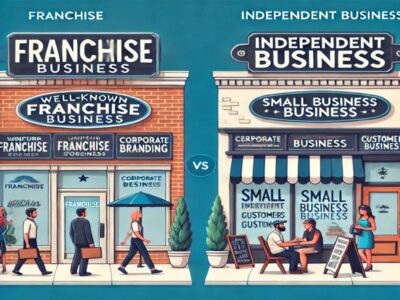This post may contain affiliate links. If you click and make a purchase or sign up, we may earn a commission at no extra cost to you. Thank you for supporting us!
When starting a business, one of the most crucial decisions you’ll face is whether to invest in a franchise or launch an independent business. Both models offer unique advantages and challenges, making it essential to carefully evaluate which option aligns best with your goals, risk tolerance, and resources. Below, we break down the key pros and cons of each business model to help you make an informed decision.
Franchise Business: Pros and Cons
A franchise business operates under the brand, structure, and operational guidelines of an established company. Entrepreneurs invest in a proven business model, gaining access to resources and brand recognition while still managing their own location.
Pros of a Franchise Business
One of the biggest advantages of a franchise is its established brand reputation. Customers are more likely to trust and engage with a well-known name, making it easier to attract a loyal customer base. Additionally, franchises come with a pre-existing business model that includes operational processes, supplier relationships, and standardized products or services, significantly reducing the risk of failure.
Franchisees also benefit from corporate support, including training programs, marketing strategies, and ongoing assistance. This support can be invaluable for those new to business ownership. Another advantage is the ability to secure financing more easily, as lenders are often more willing to fund a business with a proven track record.
Cons of a Franchise Business
Despite its advantages, owning a franchise also has drawbacks. The initial franchise fee and ongoing royalties can be expensive, cutting into profitability. Additionally, franchisees must adhere to strict corporate guidelines, limiting creative freedom in marketing, product offerings, and operational decisions.
There’s also less flexibility when it comes to vendor selection, as many franchisors require franchisees to use specific suppliers. Furthermore, while corporate marketing efforts benefit all franchise locations, individual franchisees have little control over national campaigns or branding strategies.
Independent Business: Pros and Cons
An independent business is a self-established company that operates without ties to a larger brand. Entrepreneurs have full control over branding, operations, and decision-making but must also assume full responsibility for the business’s success or failure.
Pros of an Independent Business
One of the greatest advantages of an independent business is complete autonomy. Business owners can develop their own brand, set their pricing, and create marketing campaigns tailored to their specific audience. This level of control allows for greater creativity and adaptability to market trends.
Additionally, independent businesses do not have to pay franchise fees or royalties, allowing them to retain more of their revenue. There’s also the flexibility to choose suppliers and negotiate better pricing, potentially reducing operational costs. Entrepreneurs who successfully establish a strong local presence can build long-term customer loyalty and create a unique brand identity.
Cons of an Independent Business
Running an independent business comes with a higher level of risk. Without an established brand or corporate support, entrepreneurs must develop everything from scratch, including marketing strategies, operational processes, and supply chain management. This can lead to a longer and more challenging startup phase.
Access to financing may also be more difficult for independent businesses, as lenders may view them as riskier investments. Additionally, independent business owners must handle all legal, marketing, and operational challenges on their own, which can be overwhelming without prior business experience.
Which Business Model is Right for You?
Choosing between a franchise and an independent business depends on several factors, including your financial situation, business expertise, and risk tolerance. If you prefer a structured approach with built-in brand recognition and support, a franchise may be the better option. However, if you value creative freedom and want to build something unique from the ground up, an independent business could be the right choice.
Before making your decision, research the industry, analyze costs, and consider your long-term goals. Both models offer paths to success, but selecting the right one for your personality and business vision will increase your chances of long-term profitability and fulfillment.


I appreciate the nuanced exploration of the pros and cons between franchising and running an independent business. The discussion really made me think about how personal risk tolerance and the desire for creative freedom can play such a pivotal role in choosing a model. I’m curious – do you see any trends emerging that might favor one model over the other, especially as digital tools and market dynamics evolve? Also, have you encountered any examples where entrepreneurs have successfully blended both approaches to harness the benefits of each?
Thank you for your thoughtful comment! I’m glad you found the exploration of franchising versus independent business insightful.
Regarding emerging trends, digital tools and evolving market dynamics are certainly influencing both models. One notable trend is the increasing accessibility of digital marketing and e-commerce solutions, which are leveling the playing field for independent businesses. Entrepreneurs can now leverage social media, AI-driven marketing, and automation to compete with larger, established franchises without requiring the same level of infrastructure.
On the other hand, franchises are adapting by incorporating more flexible business models. Many now offer semi-absentee ownership options, remote operational support, and digital transformation strategies to attract modern entrepreneurs who value efficiency and scalability.
As for hybrid approaches, some entrepreneurs have successfully blended both models to maximize benefits. For example, some independent business owners license their brand, processes, or technology to others, essentially creating a franchise-like system without the rigid structure of traditional franchising. Similarly, franchisees are increasingly adding their own unique touches within brand guidelines to create a localized feel while still benefiting from brand recognition and support.
Overall, the best choice depends on an individual’s business goals, risk tolerance, and desired level of control. As technology continues to evolve, we may see even more innovative business models emerge that merge elements of both franchising and independent ownership.
Thanks again for your great question!
Hi Laura. Great insights into the Pros and Cons of Franchises vs Indenpendent Businesses. I did marketing for an independent business that used franchising to grow the brand nationally. One thing I’d add is that franchisors have an exit strategy. Not all franchisees give that enough thought before ploughing ahead.
After the term of the franchise deal is up, like 5 years in, do you renew, sell, or pass it on to a family member or partner?
Franchisees don’t always think about exit strategies, but the businesses that become franchisors always have an exit strategy in place. It’s easier to sell an independent business because with a franchise, there are third-party terms, limiting the potential buyer pool.
The article does a great job highlighting the pros and cons of franchises versus independent businesses, making it a useful resource for aspiring entrepreneurs. It clearly explains how franchises offer brand recognition and support but come with fees and restrictions, while independent businesses provide flexibility but require more effort to establish. Adding real-world success stories or financial breakdowns would make it even more insightful. Overall, it’s a solid guide for anyone weighing their business options!